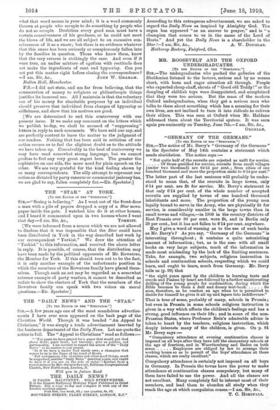"GERMANY OF THE GERMANS."
[To THE EDITOR OP THE " SPECTATOR."]
Srn,—The notice of Mr. Berry's " Germany of the Germans " in the Spectator of May 14th contains a statement which needs elucidation. The notice says :—
" Not quite half of the recruits are rejected as unfit for service.
Of those qualified for service, recruits from small villages (under two thodsand) are 6415 per cent. • from cities of one hundred thousand and more the proportion sinks to 614 per cent."
The latter part of the last sentence will probably be under- stood to mean that, of the recruits in large towns, only 6.14 per cent. are fit for service. Mr. Berry's statement is that only 6.14 per cent. of the whole number of accepted recruits are supplied by towns of one hundred thousand inhabitants and more. The proportion of the young men legally bound to serve in the Army, who are physically fit for service, is considerably smaller in the large towns than in small towns and villages,—in 1906 in the country districts of
East Prussia over 80 per cent were fit, and in Berlin only 38 per cent., but it has not fallen to 6.14 per cent. anywhere.
May I give a word of warning as to the use of such books as Mr. Berry's ? As you say, " Germany of the Germans " is interesting throughout ; it contains a quite astonishing amount of information; but, as is the case with all small books on very large subjects, much of the information is made most misleading by the lack of the limiting sentences. Take, for example, two subjects, religions instruction in schools and continuation schools, respecting which we could learn, and ought to learn, much from Germany. Mr. Berry tells us (p. 99) that " the eight years spent by the children in learning texts and creeds and Psalms by heart are followed by a further uninteresting drilling of the young people for confirmation, during which the Bible becomes to them a dull and dreary text-book So soon, therefore, as he reaches an age when he is permitted to decide for himself he gives it all up and lapses into indifference."
That is true of some, probably of many, schools in Prussia; but even in Prussia in some schools religious instruction is given in a way which affects the children's feelings and has a strong, good influence on their life ; and in some of the non- Prussian States, where Professor Rein's admirable advice is taken to heart by the teachers, religious instruction, which deeply interests many of the children, is given. On p. 81 Mr. Berry says :—
" Compulsory attendance at evening continuation classes is imposed on all boys after they have left the elementary schools at the age of fourteen, and in Wuerttemberg and Baden on both
sexes Employers are obliged by law to arrange their working hours so as to permit of the boys' attendance at these classes, which are really excellent."
Compulsory attendance is certainly not imposed on all boys in Germany. In Prussia the towns have the power to 'make attendance at continuation classes compulsory, but many of them have failed to use the power. And all the classes are
not excellent. Many completely fail to interest most of their members, and lead them to abandon all study when they reach the age at which compulsion ceases.-.--I am, Sir, &c.,
T. C. HORSFALL.










































 Previous page
Previous page